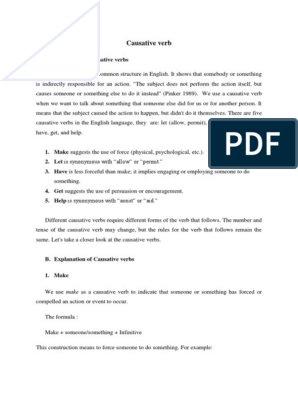Understanding the causative verbs "make," "get," "have," and "let" is essential for English learners,
as they each convey different shades of meaning in terms of causing someone to do something or
allowing something to happen. Here’s a tutorial on their differences with examples:
1. MAKE
Meaning:
• To force or compel someone to do something.
• The action is performed because of pressure, obligation, or coercion.
Structure:
• Make + someone + base verb
Example Sentences:
• The teacher made the students rewrite the essay.
(The students were compelled to rewrite the essay.)
• His boss made him stay late to finish the project.
(He was obligated to stay late.)
Key Point:
"Make" implies authority or imposition. The person doesn't have much choice in the matter.
2. GET
Meaning:
• To persuade or convince someone to do something.
• The action occurs due to encouragement or effort rather than force.
Structure:
• Get + someone + to + base verb
Example Sentences:
• I got my little brother to clean my room.
(I persuaded or convinced him to clean the room.)
• They got us to try the new restaurant in town.
(They encouraged us to go there.)
Key Point:
"Get" involves some effort or persuasion, suggesting the action isn't forced.
�3. HAVE
Meaning:
• To arrange for or instruct someone to do something.
• The action is often part of a professional or routine service.
Structure:
• Have + someone + base verb (when referring to actions performed by people)
• Have + something + past participle (when referring to things being acted upon)
Example Sentences:
• She had the plumber fix the leak.
(She arranged for the plumber to fix it.)
• We had our car washed yesterday.
(We arranged for someone to wash our car.)
Key Point:
"Have" indicates arranging for something to happen, with no implication of force or persuasion.
4. LET
Meaning:
• To allow or give permission to someone to do something.
Structure:
• Let + someone + base verb
Example Sentences:
• My parents let me stay up late last night.
(They allowed me to stay awake.)
• Please let him explain his side of the story.
(Allow him to explain.)
Key Point:
"Let" always implies permission, emphasizing freedom of choice.
Comparison Chart
Verb Meaning Implication Structure Example
Make Force or compel Obligation/Pressure Make + someone + The rain made us cancel our
�Verb Meaning Implication Structure Example
base verb picnic.
Persuade or Effort/ Get + someone + to + I got him to help me with the
Get
convince Encouragement verb groceries.
Arrange or Service/ Have + someone + She had the chef prepare a
Have
instruct Arrangement base verb special dish.
Freedom/ Let + someone + base
Let Allow or permit They let me borrow their car.
Permission verb
Practice Questions
Fill in the blanks with the correct causative verb: make, get, have, or let.
1. Can you _____ me explain my decision to the group?
2. I finally _____ my dog to stop barking by giving him a treat.
3. We _____ our windows cleaned by professionals every month.
4. They _____ us wear uniforms at the office.
Answers
1. let
2. got
3. have
4. make



















































































